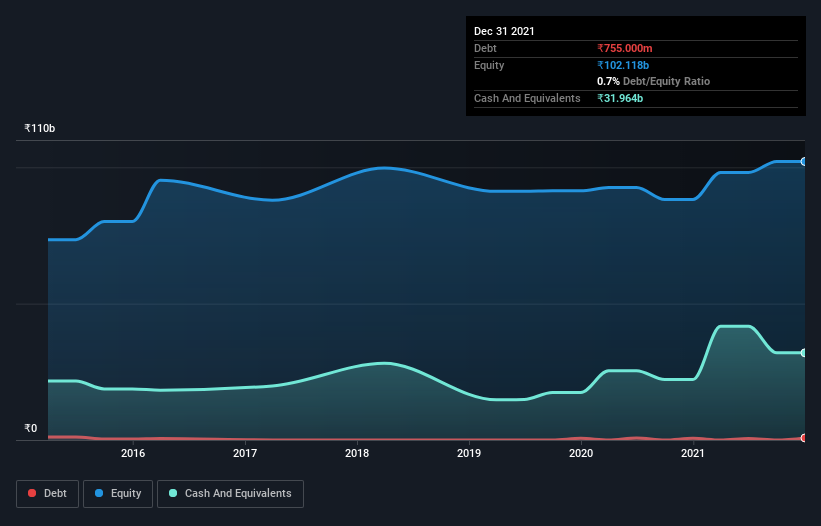
The external fund manager backed by Berkshire Hathaway's Charlie Munger, Li Lu, makes no bones about it when he says 'The biggest investment risk is not the volatility of prices, but whether you will suffer a permanent loss of capital.' It's only natural to consider a company's balance sheet when you examine how risky it is, since debt is often involved when a business collapses. Importantly, Bosch Limited (NSE:BOSCHLTD) does carry debt. But the more important question is: how much risk is that debt creating?
When Is Debt A Problem?
Debt assists a business until the business has trouble paying it off, either with new capital or with free cash flow. Part and parcel of capitalism is the process of 'creative destruction' where failed businesses are mercilessly liquidated by their bankers. However, a more frequent (but still costly) occurrence is where a company must issue shares at bargain-basement prices, permanently diluting shareholders, just to shore up its balance sheet. Of course, plenty of companies use debt to fund growth, without any negative consequences. The first thing to do when considering how much debt a business uses is to look at its cash and debt together.
View our latest analysis for Bosch
How Much Debt Does Bosch Carry?
You can click the graphic below for the historical numbers, but it shows that as of September 2021 Bosch had ₹755.0m of debt, an increase on ₹631.1m, over one year. However, its balance sheet shows it holds ₹32.0b in cash, so it actually has ₹31.2b net cash.

How Strong Is Bosch's Balance Sheet?
We can see from the most recent balance sheet that Bosch had liabilities of ₹40.6b falling due within a year, and liabilities of ₹4.47b due beyond that. Offsetting these obligations, it had cash of ₹32.0b as well as receivables valued at ₹20.4b due within 12 months. So it can boast ₹7.30b more liquid assets than total liabilities.
Having regard to Bosch's size, it seems that its liquid assets are well balanced with its total liabilities. So while it's hard to imagine that the ₹417.5b company is struggling for cash, we still think it's worth monitoring its balance sheet. Simply put, the fact that Bosch has more cash than debt is arguably a good indication that it can manage its debt safely.
Better yet, Bosch grew its EBIT by 146% last year, which is an impressive improvement. If maintained that growth will make the debt even more manageable in the years ahead. The balance sheet is clearly the area to focus on when you are analysing debt. But it is Bosch's earnings that will influence how the balance sheet holds up in the future. So when considering debt, it's definitely worth looking at the earnings trend. Click here for an interactive snapshot.
But our final consideration is also important, because a company cannot pay debt with paper profits; it needs cold hard cash. While Bosch has net cash on its balance sheet, it's still worth taking a look at its ability to convert earnings before interest and tax (EBIT) to free cash flow, to help us understand how quickly it is building (or eroding) that cash balance. In the last three years, Bosch's free cash flow amounted to 32% of its EBIT, less than we'd expect. That's not great, when it comes to paying down debt.
Summing up
While we empathize with investors who find debt concerning, you should keep in mind that Bosch has net cash of ₹31.2b, as well as more liquid assets than liabilities. And it impressed us with its EBIT growth of 146% over the last year. So is Bosch's debt a risk? It doesn't seem so to us. When analysing debt levels, the balance sheet is the obvious place to start. However, not all investment risk resides within the balance sheet - far from it. For example Bosch has 2 warning signs (and 1 which is potentially serious) we think you should know about.
At the end of the day, it's often better to focus on companies that are free from net debt. You can access our special list of such companies (all with a track record of profit growth). It's free.
Valuation is complex, but we're here to simplify it.
Discover if Bosch might be undervalued or overvalued with our detailed analysis, featuring fair value estimates, potential risks, dividends, insider trades, and its financial condition.
Access Free AnalysisHave feedback on this article? Concerned about the content? Get in touch with us directly. Alternatively, email editorial-team (at) simplywallst.com.
This article by Simply Wall St is general in nature. We provide commentary based on historical data and analyst forecasts only using an unbiased methodology and our articles are not intended to be financial advice. It does not constitute a recommendation to buy or sell any stock, and does not take account of your objectives, or your financial situation. We aim to bring you long-term focused analysis driven by fundamental data. Note that our analysis may not factor in the latest price-sensitive company announcements or qualitative material. Simply Wall St has no position in any stocks mentioned.
About NSEI:BOSCHLTD
Bosch
Engages in the manufacture and trading of automotive products in India and internationally.
Flawless balance sheet average dividend payer.


